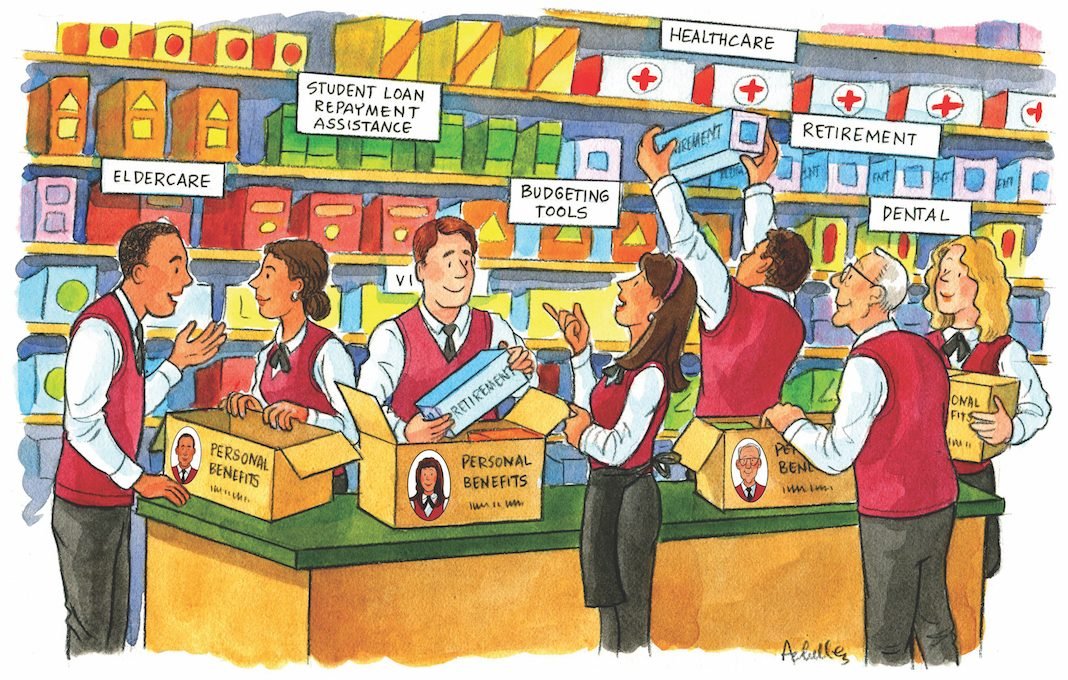Employers are beginning to see different generations, from Generation Z to Baby Boomers, across their workforce. They are all unique individuals with different troubles and needs. Lodging organizations need to understand this about their workforce when it’s time to reconsider the company’s current employee benefits package.
According to the 2018 HR Blindspot Report by the benefits-software firm League, 91 percent of employees feel companies should offer customized benefits packages; however, only 72 percent of companies actually do. This disparity is likely due to a large societal push for personalization in our day-to-day lives.
People are looking for benefits that reflect their current situations and desire flexible benefits that will adapt with them as their situations change.
Snowballing changes in technology have paved the way for hyper-personalization in the workforce. This involves using sets of data like ages, personalities, interests, and more to tailor products, services, and even benefits. Hyper-personalization is driving employees’ expectations of their benefits. People are looking for benefits that reflect their current situations and desire flexible benefits that will adapt with them as their situations change.
The future of benefits lies in hyper-personalization. It may also drive demand for an increase in the variety of benefit options that are offered. Personalized benefit options may include paid family leave, commuter cost reimbursement, pet insurance, or tuition reimbursement.
With low unemployment rates and plenty of jobs available for job seekers, this is a prime time for employers to reevaluate their approach to benefits. It is time for employers to stop offering a one-size-fits-all package for employee benefits. As personalization increases in society, so must an organization personalize its benefits based on the demographics of its workforce.
While healthcare, dental, vision, and retirement are all important benefits, they may fail to solve the root of workers’ stressors. Hotel and lodging organizations will never see sufficient employee benefit engagement until they study their workers, understand their needs, and create an annual benefits package to address those needs.
EXPLAINER
Financial Wellness
Financial wellness is the relationship between people and their money. Financially healthy employees are actively managing their day-to-day spending, are confident about how they can protect themselves from future unexpected life events, and are saving for their financial future. Financial wellness is not just a number—it’s a state of awareness and confidence in where your finances stand. A financial wellness benefit should focus on employees as individuals, engage them how they choose to be engaged, provide guidance for challenges they are currently facing, and connect them with the employer benefits that matter to them most.
For example, a common stressor for employees, including those in lodging organizations, is finances. Employees who live paycheck to paycheck may have troubles with basic financial strategies like designing a budget or building an emergency fund. These employees struggle with their financial confidence and may look to their employers for solutions. The solution, in this case, would be offering a financial wellness benefit that can provide educational resources and tools to address each employee’s specific financial needs. This could include student loan repayment assistance or budgeting tools.
Before selecting which voluntary personalized benefits to offer employees, businesses should take time to understand their workforce. What demographics do they fall into? What are their stressors? There are a lot of benefits to choose from, so employers must be prepared to select the ones that will best aid their employees. The wrong benefits will not be used by the workforce and ultimately will mean money lost for the employer.
While every employee is unique, there are common patterns seen in demographics that should be considered. For example, Millennials and Generation X are in different stages of their life, and therefore, have different priorities that will need to be met via different benefits.
Younger employees, like Millennials, pose a unique situation for employers. These employees tend to forego retirement planning in lieu of short-term goals, which may include paying off student debt, saving for a car, or focusing on current bills.
Older employees such as Generation X, on the other hand, prioritize saving for retirement. They are likely increasing their retirement contributions and are thinking about increased healthcare costs. They may also be considering how to help their children afford college and how they will take care of aging parents.
A big hurdle for employers is increasing benefits program adoption and employee engagement. This can be especially challenging in the hospitality sector, where a large portion of the workforce is made up of hourly workers in jobs like maintenance, housekeeping, and venue staff. Barriers that can largely impact an organization’s ability to achieve buy-in from this segment include technology and language differences. Because of this, lodging employers should always be thinking of engagement strategies that help bridge the gap.
One effective strategy to achieve adoption of benefits among this segment of the workforce is to host in-person benefits events. During these events, bilingual staff should be on hand to meet with employees who face the challenges listed above to explain benefit offerings.
Ultimately, hospitality organizations will never see employee benefit engagement across the board unless they assess which outside stressors are keeping their employees from performing their best work. Additionally, employers should constantly evaluate their benefits package and consider hyper-personalized benefits that will address the roots of those stressors. Only then will employees feel motivated to use their benefits and begin the cycle of continued engagement within the program.












